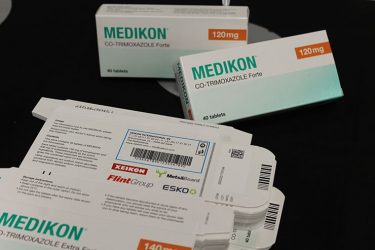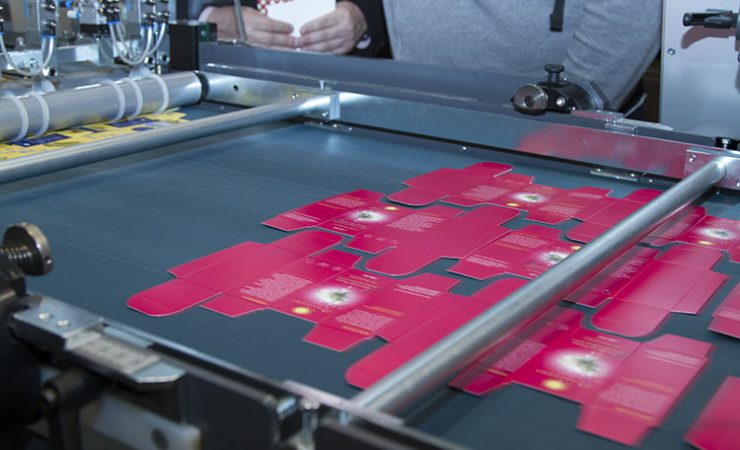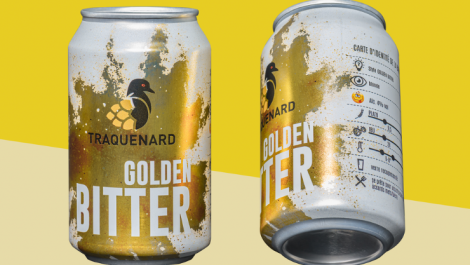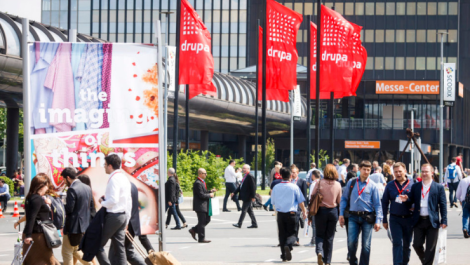Digital print is making great inroads in the carton sector, which is increasing the demand for
converting machines with quick set up capable of dealing with short runs and on-demand supply.
Neel Madsen looks at some of the options.
Germany-based Kama has a range of machinery for die-cutting, creasing, perforating, Braille, embossing and hot foil stamping, and more. The Kama ProCut 76/58 Foil die-cutting machines can finish short runs in a B2 or B3 format, as well as adding final polish if the optional hot foil stamping system is fitted. The machines feature the AutoRegister alignment system, which detects a printed register mark by camera to align each sheet to within a maximum tolerance of +/– 0.1mm for perfect sheet registration, especially with a digital press. A new SBU non-tool using blanking system is also available on the ProCut range.
For further processing, the Kama FF 52i folder gluer has been specifically designed for short run digitally printed cartons. It provides an automatic adjustment for fast set up and job change. Changeover time is minimised to around five minutes, with repeat jobs taking less time. It has a patented folding section featuring 100% inspection with ejection, plasma treatment to glue metallised and UV-coated materials, and comes prepared for incorporation into an end-to-end workflow.
The new Easycut flatbed CNC cutter from Vivid Laminating Technologies is suitable for cutting intricate designs on cartonboard, photopaper, vinyl sticker, photo-masking films, oil-board, sandblast resist rubber, PET, PVC, polyamide, stiff paper, microflute board or industrial materials, with adjustable cut pressure. It can be used for packaging proofing, pattern making, prototyping and small production runs of rigid packaging media and other sheet-fed materials.

Cartons produced using Xeikon machinery
The Xeikon Flatbed Die-cut Unit (FDU) can process 2000 sheets per hour – paper, cartonboard and microflute – in thicknesses from 160 to 890 microns. Although it was developed for Xeikon technology, it can be used for printed sheets, in sizes from 400 x 400mm up to 530 x 1000mm, from any digital or conventional press.
The FDC-510 webfed flatbed die-cutter from Edale can be configured to work as a standalone machine for converting conventionally or digitally pre-printed webs. Cutting substrates up to 600 microns depending on the configuration, it boasts a set up time of sub 15 minutes and is described as ideal for short runs from 1000–100,000 units per hour.
Highcon’s range of digital cutting and creasing machines includes the Euclid series and the Beam for converting cartons and corrugated. Virtual Packaging, in Texas, is moving from producing prototypes to production with a new Highcon Beam, which can process up to 5000 sheets per hour. CEO Monty Patterson said, ‘The Beam will allow us to produce the highly creative and distinctive prototypes and packaging required by our clients and to maintain rapid delivery without the time or costs involved in conventional die manufacture.’
Perfect Bindery Solutions (PBS) has the IML Perfect Box Solutions for the production of high quality short-run boxes. The range includes equipment for processing both the board and the cover sheet, marrying the two and then forming the base and lid of the finished box. The semi-automated processes include cutting and trimming of the sheet and board, gluing, board grooving, corner cutting, edge and corner taping and wrapping of the completed sections. Box sizes range from 60 x 60 x 10mm high – the smaller sizes are popular with the jewellery sector – up to 430 x 350 x 120mm high, at rates of up to 10 per minute. Steve Giddins, owner of PBS, said, ‘In combination with the latest digital printing, foiling, varnishing and embossing techniques, IML Perfect Box Solutions make the short-run production of bespoke boxes a practical and cost-efficient proposition.’






